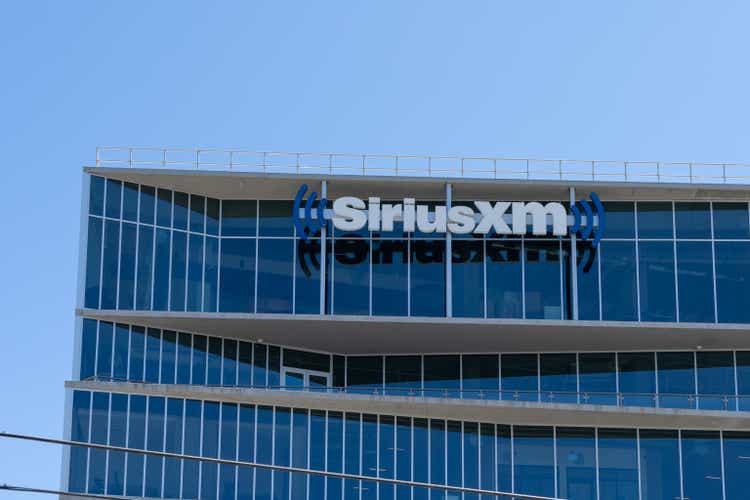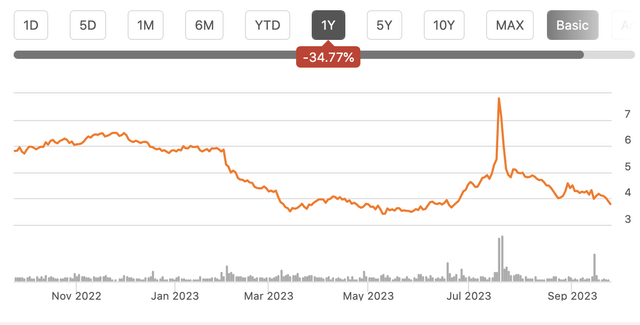Summary:
- Liberty Global proposes a risky transaction with Sirius XM Holdings Inc., which could negatively impact Sirius XM shareholders.
- Liberty Media currently owns 83% of Sirius XM Holdings, and the proposed merger would dilute existing shareholders’ ownership.
- Increased liquidity from the transaction could lead to significant selling and a potential decline in share prices for Sirius XM Holdings Inc.
JHVEPhoto
On Tuesday morning, The Liberty SiriusXM Group (LSXMA) announced a proposed transaction with Sirius XM Holdings Inc. (NASDAQ:SIRI). SIRI investors need to be careful about this transaction. While M&A is usually good news for the acquired company, this deal looks to be a risky proposition for SIRI investors, though likely a good one for LSXMA holders. However, I suspect this story is still in its early innings. For now, SIRI shares are down 5% on the news, following what has been a rough year while LSXMA shares are up 5%. I see further risk in SIRI.
Currently, Liberty Media owns 83% of the common stock of SIRI. All other investors in SIRI control just 17% of the satellite radio company. Essentially, Liberty is proposing to create a new entity into which it will place its shares of Sirius XM, alongside debt associated with them, and it will spin this entity out to shareholders of Liberty and combine it with Sirius XM. Right now, an owner of Liberty Media owns shares in a media conglomerate with wide-ranging interests. Many conglomerates trade at discount valuations as investors only like certain pieces of the business. This would make remaining Liberty simpler and give its shareholders the option to sell their stake in Sirius XM by selling the shares they receive in the Spinco, if they are negative on the business.
After this transaction, existing SIRI shareholders will own about 16% of the company, so the terms of the merger are actually slightly dilutive to SIRI shareholders. Now, SIRI shareholders do get a $0.55 cash payout, but this merely compensates them for the net debt the company is adding as part of this transaction, and this cash payout may be taxable. Some investors may be happy to trade debt on the balance for cash in their pocket, but this is fundamentally a value-neutral exchange.
This is why Liberty, in its press release, does not highlight a premium for SIRI as a rationale for the deal but rather that it creates value via “enhanced trading dynamics, including increased liquidity and likelihood of future index inclusion.” As SIRI would no longer be a “controlled company,” it could eventually be added to indices over time. However, I would question whether increased liquidity is inherently a good thing. When Liberty Media shareholders receive their shares in the new Sirius, you may see significant selling because these investors now have much more liquidity in their stakes. While Liberty itself holds the entire 83% stake, it has tax considerations, and to the extent it sells shares, it is incentivized to do so in an orderly fashion to keep the share price up.
When the shares are distributed, that coordination around sales disappears. Indeed, if you receive shares and fear others will sell, you are incentivized to do so quickly, creating a “prisoner’s dilemma.” This is why spin-outs quite often trade poorly in the first days and weeks after the spin, as some investors receive shares in an entity they do not care for. AT&T’s (T) spin-off of its shares of Warner Bros. Discovery (WBD) to its shareholders is a good example of this risk.
Ultimately, this increased liquidity and forced-selling risk is a reason why existing SIRI shareholders should demand a premium to protect themselves from this-for instance, they should own 20% of the combined company, up from 17% currently. Instead, they are receiving a discount in practice, while facing this downside risk. As long as this proposed transaction is up for debate, I expect it will be an overhang for shares.
SiriusXM is creating a special committee of its board to evaluate the proposal, and in my view, they should reject it. Currently, Liberty shareholders win. Liberty is simplifying its business, they have the liquidity to sell their pro-rata stake in SIRI, and they receive a slight premium. SIRI shareholders will likely end up footing the bill for this via a lower stock price.
Even with shares down, the stock is trading at about 14x free cash flow guidance of $1.15 billion. For a company with minimal growth (revenue was flat year over year last quarter), amid competition from steaming and podcasts, this is a reasonably full multiple that does not suggest shares are fully pricing in the risk I see.
With this transaction posing a significant risk and likely to be a persistent overhang, I would be careful of shares here and recommend selling. I would want to see shares down 15-20% to compensate for the risk that 80+% of the float may soon become available to sell, or wait for shares to fall below $3.40 before entering. For now, risks are skewed to the downside and investors should avoid SIRI.
Analyst’s Disclosure: I/we have no stock, option or similar derivative position in any of the companies mentioned, and no plans to initiate any such positions within the next 72 hours. I wrote this article myself, and it expresses my own opinions. I am not receiving compensation for it (other than from Seeking Alpha). I have no business relationship with any company whose stock is mentioned in this article.
Seeking Alpha’s Disclosure: Past performance is no guarantee of future results. No recommendation or advice is being given as to whether any investment is suitable for a particular investor. Any views or opinions expressed above may not reflect those of Seeking Alpha as a whole. Seeking Alpha is not a licensed securities dealer, broker or US investment adviser or investment bank. Our analysts are third party authors that include both professional investors and individual investors who may not be licensed or certified by any institute or regulatory body.

